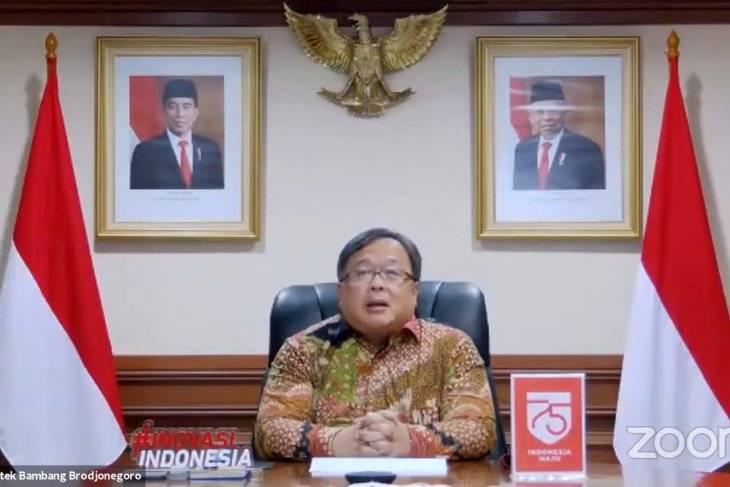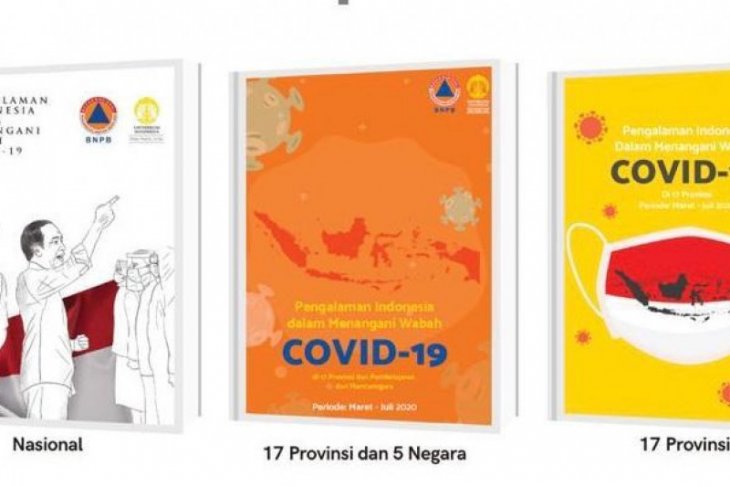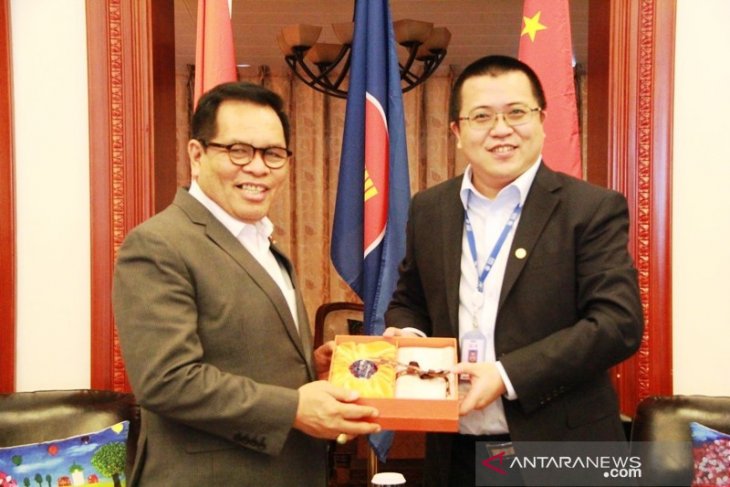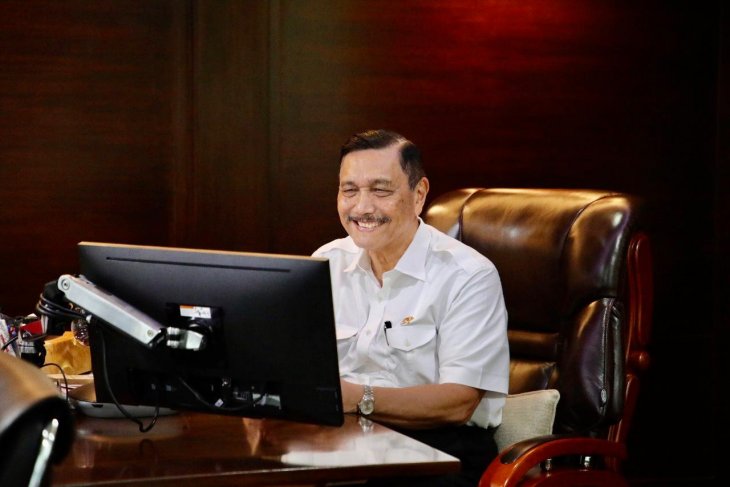Live Streaming
Program Highlight
Company Profile

Ani Hasanah
August

Minister of Research and Technology and head of the National Research and Innovation Agency, Bambang PS Brodjonegoro, speaking at an online seminar at the 12th International Symposium of the Global Indonesian Students Association, from Jakarta on Tuesday (August 18, 2020). (ANTARA/HO-Ministry of Research and Technology/ac)
Minister of Research and Technology and head of the National Research and Innovation Agency, Bambang PS Brodjonegoro, has called for using artificial intelligence to build innovative excellence in Indonesia in the future.
"We have to make innovation a spirit, a passion that emerges among our people. Only once we become innovative people, can we head towards (becoming) a developed country," said Brodjonegoro in a statement received in Jakarta on Thursday.
The minister said that artificial intelligence can benefit the Indonesian people, lead to economic efficiency, and serve as the foundation for Indonesia's innovation excellence in the future.
He made the statement at an online seminar organized by the Big Data and Artificial Intelligence Association on Wednesday. It was themed 'Strengthening Research & Innovation with AI to Foster Economic Recovery’.
The Ministry and the Agency appreciate every initiative taken to infuse artificial intelligence in every sector of the Indonesian economy, the minister said.
Artificial intelligence can be one of the tools for Indonesia to not only become a market, but also a player in the 4.0 industrial revolution, he remarked.
"Indonesia should not only be a part of the market in the 4.0 industrial revolution, but it should also have the capability to become a player, (through focusing on certain areas) one of which is the artificial intelligence sector," he said.
Brodjonegoro said that with science and technology, as well as innovation, Indonesia would be able to create added value from the natural resources it owns.
"Our economy should not only be dependent on the extraction of natural resources, (in terms of) both agriculture and mining products; but with the touch of technology and science, we have to create added value from the natural resources we possess," he explained.
He also said that innovation is the engine for the advancement of a nation, and it can only be made possible through the efforts of innovative people. (ANTARA)
August

Three books on the handling of COVID-19 from the University of Indonesia. ANTARA/HO-University of Indonesia.
The University of Indonesia launched three books on handling COVID-19 in Indonesia under the efforts to document the entire process of handling the pandemic in the country.
The books, titled “Indonesia's Experience in Handling the COVID-19 Pandemic”, “Indonesia's Experience in Handling COVID-19 Pandemic in 17 Provinces and Lessons Learned from the International Community”, and “Indonesia's Experience in Handling COVID-19 in 17 Provinces,” are expected to serve as sources of reference for stakeholders in Indonesia.
"We hope they would also be read by the people, especially stakeholders and decision makers," Head of the University of Indonesia's Disaster Research & Response Centre (DRRC), Fatma Lestari, noted in a statement received in Jakarta, Thursday.
Lestari further remarked that the books were the result of collaboration between the university and National Disaster Management Agency (BNPB) and covered several programs based on local wisdom that can be learnt and applied in other areas in handling COVID-19.
"These books are one of the forms of the university's contributions to spread inspiration and creativity, and to showcase Indonesia's hard work in handling the global pandemic," Head of the University's Board of Trustees, Saleh Husin, stated.
BNPB Head Doni Monardo noted that in a bid to handle the COVID-19 pandemic, the government has urged the people to apply health protocols to ease the burden of medical workers.
"Our approach is not directed towards the medical side, taking into account the limitations on hospitals and medical workers. To this end, we think of ways to ease the burden of medical workers by urging people to abide by health protocols," he added. (ANTARA)
August

Indonesian Ambassador to China Djauhari Oratmangun (right) and Vice President of China Gezhouba Group Internasional Engineering Co Ltd, Hu Peng, in Beijing in May 2020
Indonesia's relations with China are concentrated largely on economic diplomacy in the trade, tourism, and investment (TTI) sectors by capitalizing on the plethora of existing opportunities.
Trade and investment partnership between Indonesia and China recovered amid the ongoing global COVID-19 pandemic. Merely the tourism sector had yet to show signs of recovery.
"Hence, we are working with the Ministry of Tourism and Creative Economy and the Bali Tourism Board to continue to promote Indonesian tourism, including by preparing digital promotional materials for 'Work from Bali' and readying tourist destinations, albeit with stringent health protocols in place," Indonesian Ambassador to China Djauhari Oratmangun told ANTARA on Wednesday.
Oratmangun noted that in the first semester of 2020, merely 202,204 Chinese tourist arrivals to Indonesia were recorded through various entry points, or a decrease by 80.74 percent, from the corresponding period in 2019.
In the last two months, China’s tourism sector has begun to grow, likewise with MICE activities, including exhibitions that had started to be organized. Among the last major events was an international auto show held in Wuhan in which thousands of people visited daily, with stringent health protocols being applied.
"Changes in the people's way of living in this pandemic situation actually open up new opportunities for the Indonesia-China cooperation," the ambassador noted.
The Indonesian Embassy in Beijing has also held several economic diplomacy activities in the TTI sectors by utilizing digital platforms and influencers.
"This is part of our efforts to support the task of the Team for the Acceleration of Economic Recovery (TPPE) formed by our Ministry of Foreign Affairs," he stated.
The Indonesian Embassy in Beijing also encouraged increased cooperation in the areas of digital economy and value-added industries, particularly in the health sector and electric vehicles.
Indonesia has also pioneered and established e-commerce, financial technology, and digital infrastructure partnerships with leading companies in China, including ByteDance, Meituan Inc, Alibaba Ant Financial, Jumore, JD.com, Baidu Inc, and Tencent Holdings Ltd.
"Currently, Indonesia has five unicorns and one decacorn, some of which have established cooperation with Chinese companies," the ambassador noted.
In the meantime, in the first half of 2020, the total trade between the two countries was valued at US$35.6 billion (Rp527 trillion).
Some of Indonesia's leading products -- coal, iron and steel, swallow's nest, frozen fish, tropical fruit, packaged fruit, canned fish, footwear, household utensils, processed wood, and electronics -- had recorded a notable rise in the value of exports to China.
China remains the second-largest investor in Indonesia after Singapore, with a value of US$2.4 billion (Rp35.5 trillion), an increase of nine percent from the corresponding period in the previous year. (ANTARA)
August

Coordinating Minister for Maritime Affairs and Investment Luhut Binsar Pandjaitan ANTARA/HO Kemenko Kemaritiman dan Investasi
Coordinating Minister for Maritime Affairs and Investment Luhut Binsar Pandjaitan believes Indonesia might be able to save nearly Rp100 trillion annually by developing a train-based mass transportation system.
Of the figure, Rp40 trillion will be saved from the operating costs of motor vehicles and Rp60 trillion from the travel time, Pandjaitan stated during a webinar on Land Transportation to Knit Indonesia's Diversity in Jakarta on Wednesday.
"The value is equivalent to four percent of the regional gross domestic product (PDRB) of Jabodetabek (the Greater Jakarta areas covering Jakarta, Bogor, Depok, Tangerang, and Bekasi)," he stated.
The minister believes that the use of the mass transportation means will also result in a significant reduction in traffic congestion.
According to commuter line operator PT KAI Commuterline Indonesia (PT KCI), the number of commuter line passengers in Greater Jakarta had reached 336 million last year.
Land transportation has been instrumental in contributing considerably to the national economy. The Indonesian government is strongly committed to developing land transportation infrastructures, not only in Java but also in the rest of the country, he stated.
The government's commitment to developing a land transportation system across Indonesia is apparent from the construction of toll roads in Sulawesi, Kalimantan, Sumatra, and Bali as well as the planned development of train lines in Kalimantan, Sulawesi, and Bali, he remarked.
Quoting the results of a study conducted by the Institute for Economic and Social Research of the Economics School of University of Indonesia (LPEM FE UI), Pandjaitan explained that every one-percent hike in the construction of roads will raise economic growth by 8.8 percent.
Hence, the government has deemed it necessary to develop road infrastructures through public and private investment under a government and business entity partnership (KPBU) scheme, he stated.
"In addition, road connectivity, including through toll roads, serves as an essential component to drive economic transformation to the manufacturing and service sectors," he remarked.
Pandjaitan further highlighted the need for the government to focus on river, lake, and ferry transportation that also play a vital role as one of the connectivity factors. (ANTARA)

